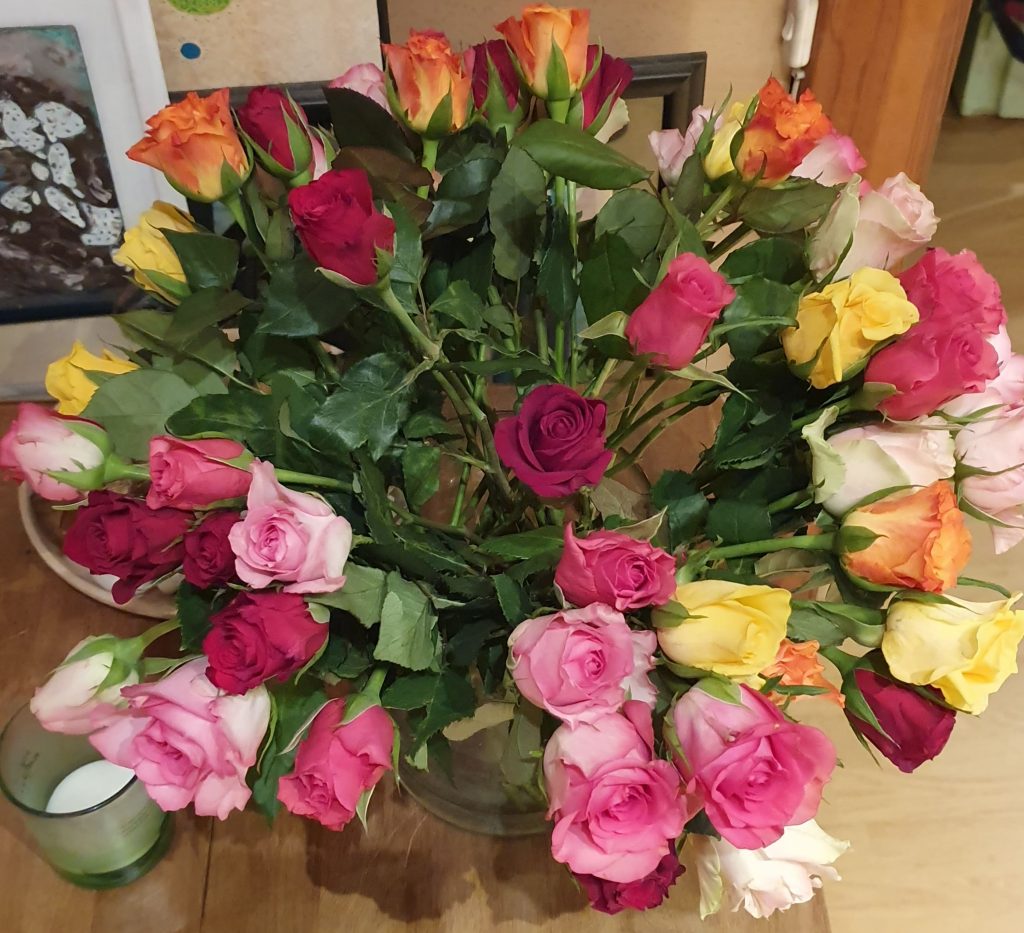
8th December 2019
I have been pondering comfort, self-care, and help – what each of them is, to me, and what makes one or other easier and/or more accessible than another. Here is where I am at. And no, I have done no Googling or other research into what each of them is. Just research in my own life and experience. They are oft-used terms in Griefland – wobbly yet somehow vital components in this messy puzzle called life. Components that I have been shining a bit of a light on this week, supported by my therapist Catherine, and my grief guru Tom Zuba. This piece of writing won’t be particularly deep, nor complete. Just reflections at a point in time.
Self-Care, and more specifically, Extreme Self-Care. I pride myself on being excellent at “extreme self-care” – a concept I readily stole from Cheryl Richardson, having purchased her book with the same title, some 9 or so years ago. I’ve never done more than flick through her book but read enough to determine my own version of Extreme Self-Care, which has been about learning to trust what is good for me, how to monitor my health and energy, and how to restore energy when it is getting low.
My ability to self-monitor is pretty damned good (she says), and my strategies for (re)filling my bucket are vast. More to the point, my strategies provide enjoyment and are readily accessible. I have long been a bit of a guru, mentor, or role-model for others (specifically professional working mums) when it comes to extreme self-care, and the same skills have served me well in the land of Grief. Nothing makes the loss go away. Nothing makes anything better. But knowing if I am moving towards more pain, or able to shift microscopically towards some ease is often the difference between an awful day and an okay day. My ability to provide myself extreme self-care is second to none. For that I am grateful. And I know it helps me live and function as well as I currently do.
Help is a different story. Particularly asking for help. I think I am pretty good at receiving, or accepting, help. Asking for help is a very hard thing to do in the land of Grief. The more skilled grief support writers advocate not asking a grieving friend, “What can I do for you?”, which puts the onus of figuring out an answer, an idea, on the grieving person, which they simply cannot do because nothing is functioning in their heart, minds, brains or bodies. Instead the best advice is to “just do something” (take the kids out, mow the lawn, do the shopping, drop off a meal). Similarly, there is a world of difference to the person who is stuck in sinking sand if you say, “here – take my hand”, vs “here – give me your hand” – the person slipping deeper into the quagmire has no energy to give anything, let alone a hand.
Asking for help is made yet harder in Griefland because of the short timeline we allow for someone’s “respectable grief”. Yes, the offers and gifts and cards come in fast and furiously for a few weeks. Lovely curries are left on doorsteps. Bunches of flowers arrive. Cards come through the letter box. Each request I have is responded to, and fast. There’s acceptance of a plea to help me get my snow tyres on/mow the lawn/weed the garden if my husband died within the past few months.
But oddly – and frustratingly – the lawn still needs mowing and the garden still needs weeding 2 ½ years on; the snow tyres need to go on and come off at regular 6-month intervals 2 ½ years later too. All of the jobs that were shared between two relatively high functioning adults need to be accomplished now by one semi-functioning adult.
It’s hard to verbalise, “please help me with my lawn/weeds/tyres because my husband died 2 ½ years ago”. Others have written more eloquently about this drying up of support when the needs, and weeds, carry on as before. Any gesture more than a few weeks or months after a loss is almost shocking it’s so rare. Just this week I received 50 beautiful roses, a whole 5 months after Julia died. I can count on one finger the person who continued to spontaneously drop off a nutritious meal more than one year after Mike died (Jane – that would be you).

Today if a friend asks me, “what can I do to help?”, I do actually say, “Do my shopping? Clean/dust the house? Walk the dog? Pick up the dog poo? Get my tyres changed? Mow the lawn?” and I usually get back a wry smile as if to say, “You’re kidding, right? No really, what can I do?”
The help I (still, mostly) need is practical, rather than emotional. I have a therapist, a grief guru, and my Mourning Glories Widbuds. I have Medjool. And I have some very good friends, one of whom is my sister. My alive kids are no longer living at home, so much of the day-to-day logistics madness has gone. But other jobs are still there, insistently building to a crescendo that cannot be ignored. I have the same number of hours in the day as I had before, but so much more to do. My disposable time for earning money, practising self-care and sleep is much reduced by the tasks that never went away just because Mike died. Available hours dissolve like salt in hot water. I just don’t have the same capacity as someone in a couple. Or someone alone who is not grieving multiple losses.
Comfort is something that’s come up twice this past week. My therapist, after I recounted an incident at the weekend where I shut down emotionally to protect myself from the dates and the “a-year-ago-this-is-what-was-happening crap”, said, “Tell me, how easy is it for you to let in comfort?” Erm – well, hmm, umm, not so easy, as it happens. Even when comfort is there, on offer, in the form of hugs, an arm around my shoulders, an offer of “let’s go to a restaurant rather than cook dinner”, I can’t seem to pick it up. My body magnet is on repel, rather than attract. I will do the hard work. Not go out for dinner but make it – willingly enough, not angrily – but just not taking the easy, comforting option. Not lean into a hug that is given, but sit there unresponsively – not rejecting, just not accepting. Holding back and resisting, rather than accepting and absorbing.
Yes, we could trace all of this back to my childhood and my more than perfectly capable parents who were just very busy people with big jobs and five kids. Or more usefully, I could just pay attention to noticing the patterns I get into, and, realising that I do eventually get out of it, do what I can to pull forward the magic ingredient that permits the shift to occur. Bring the magic ingredient from the future into the present moment. Not an easy ask when I am shut down, tired, un-resourced, inarticulate, confused and confusing. But perhaps a worthy endeavour.
I have no answers. Not even theories. I believe that this will be about noticing patterns, then developing a practice. A practice to practise.
That’s where I am at.
So, if you ever wonder why I don’t pick up on offers of “tell me what you need, tell me what would help” (nothing “helps” in grief, unless you can magic my person/people back), please just do something. I will notice and appreciate it. I promise.
And if you ever wonder how I can be so inarticulate about my needs, when I clearly need something, and especially if you have experienced me in the past as being somewhat articulate, please know that this too is totally grief- (okay – perhaps pre-menopause too) related.
And if you ever ask me for tips on extreme self-care and find them valuable, ask me how I am complementing my own extreme self-care practice with accepting comfort and extreme care from others.
I hereby commit to my fledgling practice of Letting in Extreme Comfort from Others. A work in progress. Yes indeed. A worthy endeavour.


Hi Emma, once again you write so meaningfully. Your thoughts on care and help – help.
This week, I sat at supper with a friend who’d just lost his mother… he sobbed and looked so small as he told his story. He had joined the ‘club’. A club I have belonged to since saying goodbye to my dear Mum some 9 years back. A club I did not want the entry ticket to. My friend now belongs and he knows.
As he cried, the well known pain of my membership hove into view and I am reminded of my Mum, my loss and the love behind it. I cling to the love and increasingly value my membership, because it reminds me and I know.
I can only imagine the pain of the ‘clubs’ you have unwillingly joined. One few of us will ever know and all can only fear. I hope the words you write in your blog, your friends and family are salve to your pain and may your membership become a memory of their enduring deep love.
Thinking of you, Paul